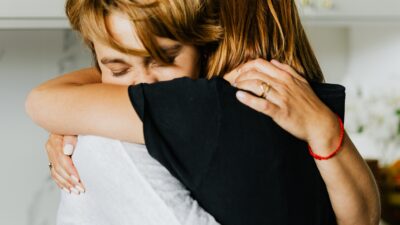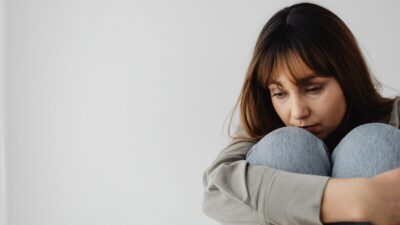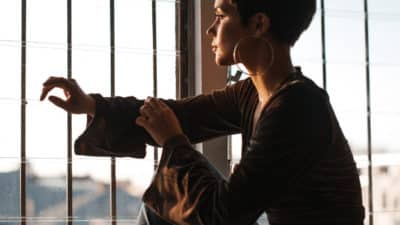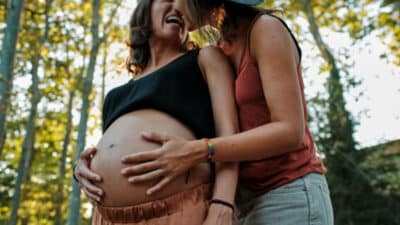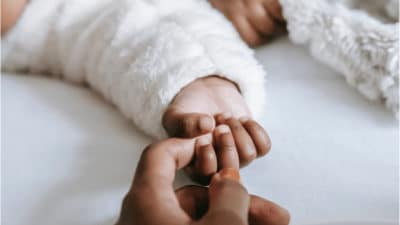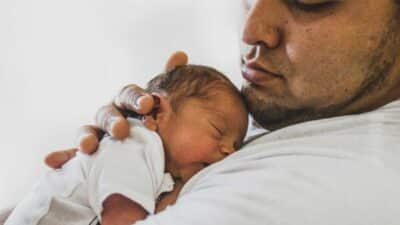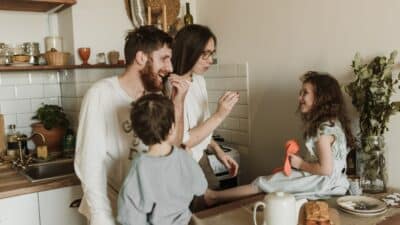My journey to a child despite endometiosis — Interview with Julia
Julia Leistner is just 23 years old and already looks back on an eleven-year long history of suffering. It was only a year and a half ago that she found out the real reason for her continued pain: endometriosis, grade III. For the newly married student, the fact that she still managed to get pregnant borders on a small miracle. In the interview, she tells of hurtful comments and misdiagnoses she had to endure over the years — but also how endometriosis changed not only her desire to have children, but also influenced her career path. You can read Julia’s heartfelt personal story, but also her social demands, here:
Hi Julia, you are now in the final trimester of your pregnancy. How are you doing?
“The last weeks have started and are gradually making themselves felt with back pain, symphysis looseness, heartburn, a constant urge to urinate and the odd spirited kick in my ribs. Of course, the excitement about the delivery and the first time with the baby is also increasing day by day.
But despite all the physical and emotional sensitivities, I have to say that I’m doing much better at the moment than I normally do when the endometriosis-associated complaints complicate my everyday life. Pregnancy was the first time I really became aware of how bad I actually feel in ‘normal life’. Although the last few months have definitely not been easy for me.”
In what way is your pregnancy a small miracle?
“In November 2020, I was diagnosed with endometriosis after undergoing a laparoscopy. My right fallopian tube was completely inflamed and impermeable. In addition, a few weeks later I learned that my AMH level* was below one, which was far too low for my age (21 at the time). My gynaecologist as well as other endometriosis and fertility specialists I consulted in the following months, agreed that in my specific case it could be quite difficult to achieve a spontaneous pregnancy without medical support. And yet, almost exactly one year after my endometriosis diagnosis, I held a positive pregnancy test in my hand — without artificial insemination or any other medical support. No one expected it, least of all me.”
*AMH value = anti-Müllerian hormone
The level can be temporarily low shortly after an operation — for example after a cyst removal — but as this tissue hda not been affected in my case, my doctor could not explain this low level.

First: Congratulations on your pregnancy! Could you outline your experience with endometriosis for us?
“I had my first menstruation in the fourth grade at the age of ten, which is typical for many endometriosis sufferers. From the beginning, very severe lower abdominal pain accompanied me every month. It was not uncommon for me to be unable to go to school or go about my daily life because of it, which in addition had already put an immense emotional strain on me at the time.
Over the years, more and more symptoms came along. What I thought for years was irritable bowel syndrome, bladder infections, a poor immune system and general hypersensitivity finally made sense with the diagnosis. But until I was eventually taken seriously, I had to endure a lot of ignorance for eleven years. The choice of words may sound dramatic at first, but I was deprived of a not inconsiderable part of my childhood and youth by doctors, teachers, family members and friends who repeatedly suggested that I was too sensitive, too weak. Hardly anyone could understand what was going on in my body — at some point not only during my period, but cycle-independent, in my case every day. Of course, these hurtful statements were also made out of their ignorance and were certainly in the least cases of malicious intent, but many sentences are unfortunately formative for me to this day.
I first came across the term “endometriosis” in the summer of 2020. Soon after a short research, I had the feeling that this could definitely apply to me, after all, my symptoms were textbook: chronic lower abdominal pain, diarrhoea, pain when urinating, pain during and after sexual intercourse, food intolerances, fatigue, exhaustion, increased susceptibility to infections. So I raised my suspicions with my gynaecologist at the time, with whom I had already been receiving treatment for eight years and who had never taken my complaints seriously, let alone treated them appropriately — apart from prescribing me the pill as a miracle cure, of course, what else. I will never forget her reaction: “Well, now that you mention it … I could have thought of that myself”.
A few weeks later I had an appointment at a (non-certified) endometriosis centre in Leipzig. For the first time in my life I felt really taken seriously in this consultation. The medical history was conspicuous, but the palpation and ultrasound examinations showed no obvious findings. Together with the attending doctor, I nevertheless decided to make an appointment for a laparoscopy as soon as possible. The symptoms spoke for themselves and I needed certainty.
I finally had the operation in November 2020. In addition to the laparoscopy, I also had a ureteroscopy and a cystoscopy, and the permeability of both my fallopian tubes was checked. During the operation, I was diagnosed with endometriosis grade III (out of IV), which corresponds to moderate endometriosis. My urinary bladder and right fallopian tube were particularly affected.”
How did you feel when you were diagnosed with endometriosis after the surgery?
“The operating doctor was at my hospital bedside a few hours after the surgery and told me about the results. I can’t remember everything because of the after-effects of the anaesthetic, but I cried a lot — out of relief and fear at the same time. Relief because finally, after all these years, it was clear that I wasn’t imagining these pains, that I wasn’t too sensitive or even crazy. And fear, because I suddenly realised that with this certainty came the fact that I was chronically ill.”
Did you realise with the diagnosis that it would possibly be difficult to have a child of your own?
“That’s a question I still think about a lot today. Before my own diagnosis, I was of course rationally aware that infertility is a not insignificant symptom of endometriosis. But at that moment, the desire to have children was still such a distant topic for me that — perhaps out of naivety or self-protection — I hardly thought about the fact that I, of all people, could be affected by infertility.
My partner and I had already been a couple for seven years at that point and knew that we both wanted to have children together at some point, but not yet at 21. For us, the focus was on completely different things. My plan had always been to finish my studies first and to have both feet firmly on the ground in my professional life before I would make a self-determined decision to start planning for children.
But when the endometriosis diagnosis was confirmed and the other findings were gradually added, I slowly realised that I probably shouldn’t go ahead as originally planned if I wanted to have a realistic chance of having biological children. I felt robbed of my entire life plan. My reality of life changed radically within a few months, and I was incredibly angry and helpless because this self-determination was (felt) taken away from me.”
What strengthened you during this difficult time?
“In addition to conservative options such as surgical endometriosis remediation and taking synthetic hormones (in my case Dienogest), I decided to take a holistic approach to my symptoms. I sought support in the form of psychotherapy, went regularly to physiotherapy and manual therapy, and I informed myself very intensively on the topics of endometriosis, the desire to have children and psychology. What also helped me a lot in terms of acceptance and dealing with the disease was the exchange with other sufferers, first via social media and later in ‘real’ life, which resulted in some good friendships.”
Please describe to us how your own childbearing journey unfolded. What feelings did you have when your pregnancy test turned out positive?
“My initial defensiveness about the whole infertility issue slowly evolved into more of “what if we actually did try?”. I was in a privileged position of having (and to this day still have) an incredibly supportive and understanding partner by my side who not only put up with my tangled thoughts and feelings during this time, but also tried to resolve them.
He had always wanted to become a father in his mid-20s, which we had been discussing heatedly from time to time in the years before the diagnosis, as I had not been wanting to even start planning children for a few years. However, when the tide slowly turned and my thoughts of perhaps trying already now became more and more concrete, it was not always easy for him to allow this thought either.
During this time, we often talked about the supposed “perfect timing”, weighed up biological, social and financial aspects and finally came to the decision that after stopping the Dienogest* (which I no longer wanted to take due to numerous side effects), we would also no longer use contraception. Several doctors had prepared us for the fact that with my conditions it would be extremely difficult to get pregnant without medical support. Therefore, neither of us expected that it would actually work.
Three months after stopping the hormones, my menstruation stayed away. I didn’t think much of it, after that short amount of time — and after a total of nine years on hormones — my cycle wasn’t really regular anyway. Nevertheless, I took a test — the first pregnancy test of my life, by the way — spontaneously in the evening after university to rule out the possibility of something being wrong. And yet the second line on the test was immediately and undeniably visible.
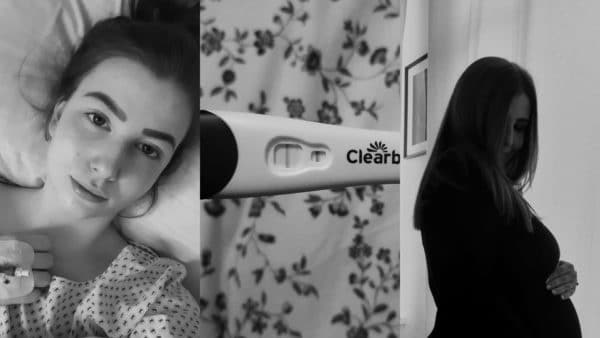
I felt both enormous happiness and fear at the same time. When you hear over and over again that a spontaneously occurring pregnancy is almost impossible in your case, then you also know: that this miracle in your own body is incredibly fragile and precious, and not to be taken for granted. My fear that the pregnancy would not remain intact was immense, especially in the first months.
Now, with only a few weeks of pregnancy left, I actually feel relatively calm. I also have hardly any concerns about the birth but I am rather excited about this unique experience. I am looking forward to my baby and am incredibly grateful that this miracle has found us.”
Your experiences have also had an impact on your “vocation”, right?
“In October 2017 I started studying to become a grammar school teacher for English and ethics . At the moment, I’m pausing my studies for three semesters due to my pregnancy and parental leave. As my symptoms have been getting stronger over the last few years, I have had to adjust my workload and will therefore not be able to complete my degree in the standard course duration time anyway. I am grateful that I am able to study at a slower pace and adapt my education to my capacities so that my performance does not have to suffer. At the same time, I keep wondering how I will be able to work with my symptoms as a teacher later on and meanwhile to live up to my students expectations, but I try to look to the future optimistically.
Endometriosis has also had a significant influence on the choice of my part-time job: since April 2021, I have been working as a student assistant at the Endometriosis Association Germany supporting the work in its office. Here I was able to make valuable contacts and learn a lot about the work of the association, about the disease and also about myself. The work has actually had a healing influence on me and my path in life. In a couple of weeks I will embark on my maternity leave.”
What does the support of the Endometriosis Association look like in concrete terms?
“We offer telephone counselling for people suffering from endometriosis and their relatives — regardless of where a patient stands information wise: whether the suspected diagnosis has just been received for the first time or the one has been living with the disease for many years. In addition, there is of course a big focus on nationwide public education, cooperations with institutions in the health and political sector as well as on collaborating with self-help groups and clinics.”
What tips can you give to other women who also suffer from endometriosis and want to have children? What does in fact help, what supports?
“I think that the exchange with other endometriosis sufferers has helped me the most. Therefore, I can only urge every sufferer to connect with others, be it via Instagram, in a local support group or any other way. I found it tremendously helpful to understand how endometriosis, the desire to have children and the psyche are intertwined. Moreover I read lot of books, attended online events and tried to educate myself on my diagnosis to really understand what’s actually going on in my body and my psyche.”
Endometriosis patients are often not taken seriously with their symptoms. Many of them have suffered for a long time. What do you expect from society / medicine / politics in terms of education? What needs to change?
“What has had a decisive influence on me and my endometriosis story was the fact that I — as a 21-year-old woman at the time who openly discusses periods and sexuality and who is a person generally educated on those topics — learned about the disease endometriosis so late. And this despite the fact I was affected myself and had been for so many years.
It is frightening how easily society relies on the narrative that menstruation and its associated ailments are not appropriate for public discussion. After all, other chronic illnesses have thankfully been taken seriously in our society for a long time — so we know it can work. I hope that in the future all endometriosis fighters will not have to justify themselves as to why they “act like that” or why they are “so sensitive”.
We are not sensitive. We are chronically ill. Often for many years without knowing. The average time until a diagnosis is made, takes up seven to ten years in Germany. And this is exactly where society has to start. Politicians in charge have to take urgent care of the needs of endometriosis sufferers, the curricula of the individual federal states have to be adapted and there has to be more than just a short lecture on the subject in medical school. There still is a lot that needs to be changed, and I am confident that every step in the right direction, no matter how small, can ultimately bring about progress — even if it is only the open, de-tabooed exchange in our own communities.”
About Julia Leistner:
Julia is 23 years old and just married her boyfriend, whom she has known for ten years. Julia lives in Leipzig, but is originally from the Vogtland. She is studying to become a teacher and is expecting her first child soon.
About Fertilly
At Fertilly, we have made it our mission to accompany couples (homosexual and heterosexual) and singles on the way to fulfilling their child wish. In doing so, it is important to us to create transparency in the area of fertility services, to provide information and knowledge on the topics of pregnancy and fertility and to help you to find the most suitable Fertility Center. Through cooperation with first-class Fertility Centres and clinics in Europe, enquiries about Fertilly are given preferential treatment. This means that our patients avoid the usually long waiting times and get appointments more quickly.
If you would like more information about Fertility Centers, success rates and prices, please contact us using this questionnaire. We will advise you free of charge and without any obligation.
-
Answer the first questions in the online form in order to book an appointment. This way we can better address your needs during the conversation.
-
We will find the best contact person for your individual needs. Schedule 20 minutes for the consultation.
-
We will introduce you to the right fertility clinic from our network, make an appointment and accompany you until your wish for a child is fulfilled.



